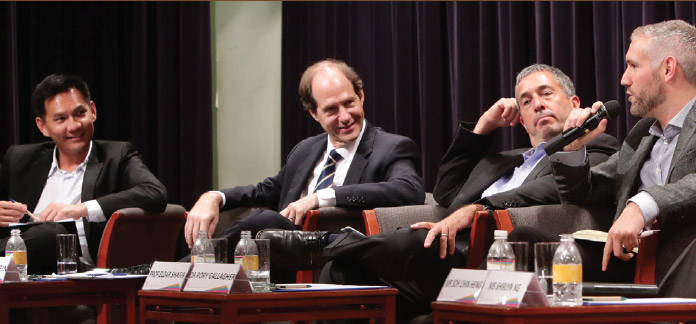
(L-R) Donald Low, Associate Dean (Research and Executive Education) at the LKY School, who chaired the symposium, Prof. Eldar Shafir, Princeton University; Prof. Cass Sunstein, Harvard Law School; and Dr. Rory Gallagher, Managing Director, Behavioural
Insights Team UK.
As governments begin to realise the importance of policy strategies that are both light of touch and low in cost, the proper design of public policy has never been more important. In a symposium co-organised by the LKY School and
the Civil Service College, thought-provoking presentations challenged many conventionally held views about policymaking.
Understanding What Works
Public policy can not only incorporate many lessons from behavioural economics, but can also serve as a solid foundation from which to apply insights from psychology to questions of economic policy, argued the speakers, Prof. Eldar Shafir, Princeton University;
Prof. Cass Sunstein, Harvard Law School; and Dr. Rory Gallagher, Managing Director, Behavioural Insights Team UK. Donald Low,
Associate Dean (Research and Executive Education) at the LKY School, who chaired the symposium, has documented the use of behavioural insights in the crafting of Singapore’s public policies with Behavioural Economics and Policy Design: Examples from Singapore.
Policy-makers should beware of imposing cognitive taxes on the poor… Filling out long forms, preparing for a lengthy interview, deciphering new rules, or responding to complex incentives all consume cognitive resources. Policy-makers rarely recognise
these cognitive taxes; yet, our results suggest that they should focus on reducing them. ” Prof Eldar Shafir
Cognitive and Bandwidth
Taxes One common thread emerged—the need for the simplification of public policy. In 2010, the British government set up the Behavioural Insights Team (BIT) to look at policy tweaks that take into account psychological quirks.
Now semi-autonomous, the “Nudge Unit” (the nickname inspired by Prof. Sunstein and Richard Thaler’s 2008 book, Nudge) continues to advise on the application of randomised controlled trials and behavioural insights in public policy.
In July 2014, Education Minister Heng Swee Keat said, “Policies are by design complicated, making it impossible to understand every facet, but it is important for the government to step up on how it communicates them.” Analogous to such conundrums, Prof.
Sunstein said that the ideal government policy is akin to “a tablet computer, where the user interface is simple and intuitive” while the technology behind it is complex and advanced. Prof. Shafir contextualised the importance of simplification, particularly
for vulnerable groups.
Singapore’s welfare provision is achieved through a “many helping hands” approach. This ensures that no single organisation or government body has to bear sole responsibility for the provision of welfare. Thus, having different agencies and organisations
provide specific assistance, via stringent applications and background checks, ensures that welfare is only distributed to the genuinely needy.
However, the means of attainment is both onerous and intrusive. Applicants for welfare assistance would be required to complete multiple forms—often providing the same information repeatedly—and subjecting themselves and their families to ‘means testing’.
Research by Prof. Shafir and Dr. Rory, shows that the poor are often unable to avail themselves to these welfare services as their scarcity of wealth “captures” their minds—imposing a large bandwidth tax.
In 2013, the Ministry of Social and Family Development launched the Social Service Offices (SSOs). Located in HDB towns and designed as one-stop centres, the SSOs are tasked with providing the needy with access to more coordinated help. This is only the
first step. It is important that a government, that has demonstrated in sincerity through the creation of multiple welfare programmes, continues to employ behavioural insights in the crafting and communication of policies.
__________________________________________________________________________
Vignesh Louis Naidu is a case researcher at the Case Study Unit, LKY School. His email is sppvln@nus.edu.sg